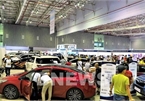The Association of Indonesia Automotive Industries (Gaikindo) has reported an unprecedented car sales decrease in May. Only 3,551 cars were sold in this month, a sharp fall of 95 percent compared with the same period last year and 54 percent compared with April 2020.

Gaikindo predicted that the car sales would continue to drop dramatically in June because of the pandemic crisis.
The Thai Automotive Industry Association (TAIA) said the industry has suffered heavily from Covid-19 with total output decreasing from 54,000 products a month earlier this year to 28,000 products a month in May 2020.
Thailand and Indonesia have the highest automobile output in Southeast Asia. In 2019, Thailand churned out 2,013,710 cars, and Indonesia 1,286,848.
About 30 percent of cars made in Indonesia are exported. The country initially planned to export 450,000 cars this year, but the real export amount might be 200,000 because of Covid-19.
| Automobile production in Indonesia and Thailand has resumed, but domestic demand is very low, which has prompted manufacturers to boost export. They asked governments to reduce taxes and fees and support them to optimize production capacity. |
The same situation occurred in Thailand, where the output has dropped by two-thirds and very few orders have come.
Automobile production in Indonesia and Thailand has resumed, but domestic demand is very low, which has prompted manufacturers to boost export. They asked governments to reduce taxes and fees and support them to optimize production capacity.
When trying to boost exports, Thai and Indonesian manufacturers think of Vietnam, which has been a large market for them over the years.
As of May, 31,000 imported cars had been sold in Vietnam, while 28,000 cars were imported, a decrease of 40 percent compared with the same period last year. However, the CBU imports from Indonesia and Thailand will be increasing in the time to come, when the economy recovers.
With the new regulations, which don’t require VTA certificate (vehicle type approval) and examination of every import consignment, the conditions are very favorable for imports.
Meanwhile, imports are 20 percent cheaper than domestically made products and subject to zero percent tax, so they have big advantages.
Domestically assembled cars are awaiting the decision on the 50 percent registration tax cut, expected to be applied until the end of 2020. However, this won’t make the cars much cheaper than the imports from Thailand and Indonesia.
Analysts warned that with the support of their governments, Indonesian and Thai manufacturers may export products to Vietnam at low prices. If so, the market would fall into Indonesian and Thai hands and there would be no made-in-Vietnam cars.
Tran Thuy

Vietnam's automobile market sees 62 percent surge after social distancing
The sales of automobile surged 62 percent month-on-month in May following the end of social distancing measures, according to the Vietnam Automobile Manufacturers’ Association (VAMA).

Inconsistent policies burden VN automobile industry
Car sales dropped sharply by 40 percent in Q1 2020 as several industries cannot reach agreement on solutions to develop the automobile industry.
 More and more cheap cars will flood the Vietnamese market in upcoming months as automobile manufacturers in Thailand and Indonesia have urged their governments to apply measures to boost car exports.
More and more cheap cars will flood the Vietnamese market in upcoming months as automobile manufacturers in Thailand and Indonesia have urged their governments to apply measures to boost car exports.